Budget as it happened: Chancellor sets out his spending plans
Rishi Sunak has pledged to do ‘whatever it takes’ to help people and businesses through the coronavirus crisis.
Chancellor Rishi Sunak has delivered his Budget in the House of Commons.
Mr Sunak pledged to do “whatever it takes” to help people and businesses through the coronavirus crisis.
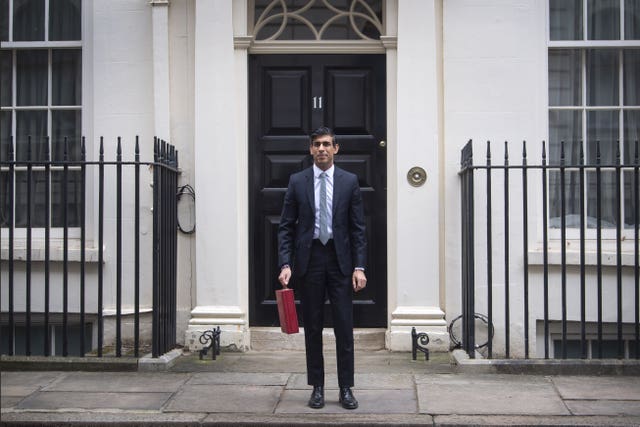
He aims to use the Budget to “get people through to the other side of the crisis” – with the furlough scheme and other financial lifelines set to be extended – and set a course for an economic bounceback.
Here’s the latest:
1.28pm
Concluding his Budget, the Chancellor said: “An important moment is upon us. A moment of challenge and of change. Of difficulties, yes, but of possibilities too. This is a Budget that meets that moment.”
1.27pm
Freeports – “special economic zones with different rules to make it easier and cheaper to do business” – will be located at East Midlands Airport, Felixstowe and Harwich, the Humber region, the Liverpool City Region, Plymouth, Solent, Thames and Teesside.
1.26pm
Mr Sunak confirmed the Treasury would establish a new economic campus in Darlington, and said there would be more than £1 billion for 45 new towns deals.
He also said: “We’re creating a £150 million fund to help communities across the UK take ownership of pubs, theatres, shops, or local sports clubs at risk of loss – putting more power in the hands of local people.”
1.25pm
Mr Sunak announced city and growth deals in Ayrshire, Argyll and Bute and Falkirk, adding there will be three more in North Wales, Mid Wales, and Swansea Bay.
There will be funding for the Holyhead hydrogen hub, the Global Centre of Rail Excellence in Neath Port Talbot, the Aberdeen Energy Transition Zone, and the Global Underwater Hub and the North Sea transition deal.
1.23pm
Mr Sunak said he was increasing the funding for the devolved administrations by £1.2 billion for the Scottish Government, £740 million for the Welsh Government, and £410 million for the Northern Ireland Executive.
1.22pm
More than £1 billion will be given for 45 new Town Deals, the Chancellor announced.
1.21pm
There will be a set of UK-wide “Help to Grow” schemes, to offer access to management training and to provide online training to firms.
The Chancellor said: “Becoming a scientific superpower is something we can be – I don’t think that’s hubristic or unrealistic.”
He added: “I’m providing an extra £1.6 billion today to continue the rollout and improve our future preparedness. And I want to make the UK the best place in the world for high growth, innovative companies.”
1.20pm
The Chancellor confirmed an additional £1.6 billion for the coronavirus vaccine rollout and to “improve future preparedness”.
1.19pm
Mr Sunak said he was issuing an updated monetary policy remit for the Bank of England, reaffirming the 2% inflation target while reflecting “the importance of environmental sustainability and the transition to net zero”.
UK savers will be given the chance to support green projects.
Dame Clara Furse has been asked to establish a new group to position the City as the “global leader for voluntary, high-quality carbon offset markets”.
1.18pm
Mr Sunak said the UK Infrastructure Bank will be located in Leeds.
“The Bank will invest across the UK in public and private projects to finance the green industrial revolution.”
He said the Government is also funding new port infrastructure to build the next generation of offshore wind projects in Teesside and Humberside.
1.17pm
1.16pm
1.15pm
On duties, Mr Sunak told MPs: “I can confirm that the planned increases in duties for spirits – like Scotch whisky – wine, cider and beer will all be cancelled.
“All alcohol duties frozen for the second year in a row – only the third time in two decades.
“And right now, to keep the cost of living low, I’m not prepared to increase the cost of a tank of fuel. So the planned increase in fuel duty is also cancelled.”
1.14pm
Mr Sunak said there will be a “super deduction” for companies when they invest, reducing their tax bill by 130% of the cost.
1.11pm
All alcohol duties will be frozen for the second year in a row and the planned increase in fuel duty has also been cancelled.
1.10pm
The Chancellor said he did not believe it would be right to increase the rates of tax on working people: “I believe our approach, while bold, is compatible with our duty as a fiscally responsible and business friendly Government.
“This is the right choice and I’m confident it will command public assent.”
1.09pm
A taper above £50,000 will also be introduced to ensure only businesses with profits of £250,000 or greater will be taxed at the full 25% rate.
Mr Sunak told MPs: “That means only 10% of all companies will pay the full higher rate. So yes, it’s a tax rise on company profits, but only on the larger, most profitable companies – and only in two years’ time.
“For the next two years, I’m also making the tax treatment of losses significantly more generous by allowing businesses to carry back losses for three years, providing a significant cash flow benefit.
“This means companies can now claim additional tax refunds of up to £760,000. And because of the current 8% bank surcharge, the implied overall tax rate for banks would be too high. So we will review the surcharge, to make sure the combined rate of tax on the UK banking sector doesn’t increase significantly from its current level – and to make sure this important industry remains internationally competitive.”
1.07pm
The rate of corporation tax, paid on company profits, will increase to 25% in April 2023, the Chancellor said, but small businesses with profits of £50,000 or less will continue to be taxed at 19%.
1.06pm
Mr Sunak said he was maintaining at their current levels the inheritance tax threshold, the pensions lifetime allowance and the annual exempt amount in capital gains tax until April 2026 and, for two years from April 2022, the VAT registration threshold.
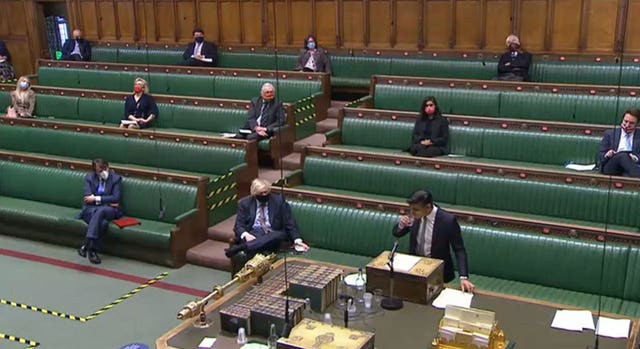
1.05pm
The Chancellor told MPs: “Nobody’s take-home pay will be less than it is now as a result of this policy.
“But I want to be clear with all members that this policy does remove the incremental benefit created had thresholds continued to increase with inflation.
“We are not hiding it, I am here, explaining it to the House and it is in the Budget document in black and white. It is a tax policy that is progressive and fair.”
1.04pm
Mr Sunak said the Government will not raise rates of income tax, national insurance or VAT: “Instead, our first step is to freeze personal tax thresholds.
“We will of course deliver our promise to increase it again next year to £12,570, but we will then keep it at this more generous level until April 2026.
“The higher rate threshold will similarly be increased next year, to £50,270, and will then also remain at that level for the same period.”
1.03pm
The Chancellor said of his principles: “First, while it is right to help people and businesses through an acute crisis like this one, in normal times the state should not be borrowing to pay for everyday public spending.
“Second, over the medium term, we cannot allow our debt to keep rising and, given how high our debt now is, we need to pay close attention to its affordability.
“Third, it is sensible to take advantage of low interest rates to invest in capital projects that can drive our future growth.”
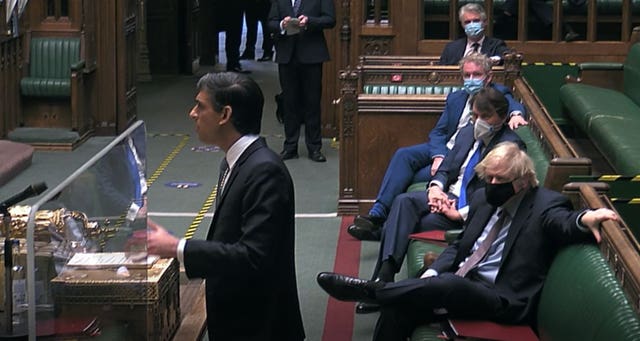
1.01pm
Mr Sunak said borrowing will fall to 4.5% of GDP in 2022/23, 3.5% in 2023/24 then 2.9% and 2.8% in the following two years due to action he is taking.
He told MPs: “While underlying debt rises from 88.8% of GDP this year to 93.8% next year, it then peaks at 97.1% in 2023/24, before stabilising and falling slightly to 97% and 96.8% in the final two years of the forecast.
“The amount we’ve borrowed is only comparable with the amount we borrowed during the two world wars. It is going to be the work of many governments, over many decades, to pay it back.
“Just as it would be irresponsible to withdraw support too soon, it would also be irresponsible to allow our future borrowing and debt to rise unchecked. When crises come, we need to be able to act. And we need the fiscal freedom to act. A freedom that you only have if you start with public finances in a good place.”
1pm
Borrowing is forecast to be £234 billion – 10.3% of GDP – next year, the Chancellor said, but it will fall to 4.5% of GDP in 2022-23, 3.5% in 2023-24, then 2.9% and 2.8% in the following two years.
12.59pm
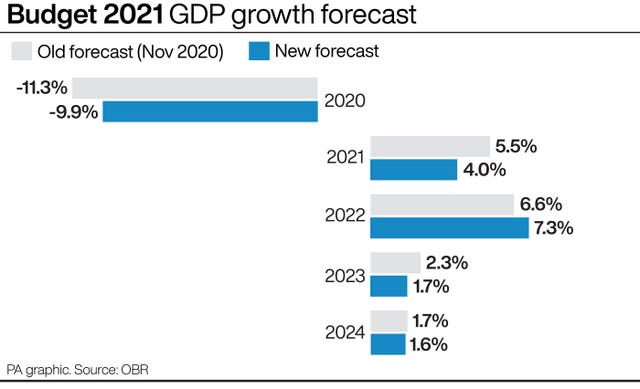
12.58pm
Mr Sunak said his measures to support the economy amounted to £65 billion over this year and next, taking total Government support to £407 billion over that period.
12.57pm
The Chancellor said coronavirus has caused one of the “largest, most comprehensive and sustained economic shocks this country has ever faced”, and added the Government has delivered “one of the largest, most comprehensive and sustained responses this country has ever seen”.
12.56pm
12.55pm
The stamp duty cut will continue until the end of June, with the nil rate band set at £250,000 – double its standard level – until the end of September, the Chancellor said.
12.55pm
Mr Sunak said the 5% reduced rate of VAT for the tourism and hospitality sector will be extended for six months to the end of September, with an interim rate of 12.5% for another six months after that.
12.54pm
The Chancellor said the business rates holiday for the retail, hospitality and leisure sectors would continue until the end of June, and would be discounted by two-thirds for the remaining nine months of the year.
12.53pm
Mr Sunak confirmed there will be a new restart grant in April to help businesses reopen with £5 billion of new funding.
12.53pm
The Chancellor said funding to support survivors of the Thalidomide scandal runs out in 2023, adding: “They deserve better than to have constant uncertainty about the future costs of their care.
“So not only will I extend this funding with an initial down payment of around £40 million, I am today announcing a lifetime commitment, guaranteeing funding forever.”
12.52pm
Mr Sunak announced an extra £19 million for domestic violence programmes, telling MPs: “To reduce the risk of reoffending, and to pilot a network of ‘respite rooms’ to provide specialist support for vulnerable homeless women, to recognise the sacrifices made by so many women and men in the armed forces community, I’m providing an additional £10m to support veterans with mental health needs.”
12.52pm
12.51pm
The £20 weekly increase for Universal Credit will continue for a further six months.
The minimum wage will increase to £8.91 an hour from April.
On apprenticeships, Mr Sunak said: “I’m doubling the incentive payments we give businesses to £3,000 – that’s for all new hires, of any age.”
12.50pm
Mr Sunak said the full 80% grant will be given to people whose turnover has fallen by 30% or more: “People whose turnover has fallen by less than 30% will therefore have less need of taxpayer support and will receive a 30% grant.”
On changes to the self-employed scheme, the Chancellor said: “When the scheme was launched, the newly self-employed couldn’t qualify because they hadn’t all filed a 2019/20 tax return.
“But as the tax return deadline has now passed, I can announce today that, provided they filed a tax return by midnight last night, over 600,000 more people, many of whom only became self-employed last year, can now claim the fourth and fifth grants.”
12.48pm
On the furlough scheme, the Chancellor told MPs: “As businesses reopen, we’ll ask them to contribute alongside the taxpayer to the cost of paying their employees. Nothing will change until July, when we will ask for a small contribution of just 10% and 20% in August and September.”
Mr Sunak said support for self-employed workers will also continue until September, with the fourth grant providing three months of support at 80% of average trading profits. He noted for the fifth grant, people will continue to receive grants worth three months of average profits – with the system open for claims from late July.
12.46pm
The Universal Credit increase of £20 per week will continue for a further six months, the Chancellor said.
12.45pm
Mr Sunak said a July 2020 forecast suggested unemployment could peak at 11.9%, telling the Commons: “Today, because of our interventions, they forecast a much lower peak: 6.5%.
“That means 1.8 million fewer people are expected to be out of work than previously thought. But every job lost is a tragedy, which is why protecting, creating and supporting jobs remains my highest priority.”
12.43pm
Mr Sunak confirmed the furlough scheme will be extended to the end of September, as will support for the self-employed.
12.42pm
The Chancellor said Covid-19 has done “profound damage” to the economy and the forecasts make clear that “repairing the long-term damage will take time”.
The Chancellor said the OBR expects the economy will be 3% smaller than it would have been in five years’ time because of the coronavirus crisis, but that the economy is forecast to grow this year by 4%, by 7.3% in 2022, then 1.7%, 1.6% and 1.7% in the last three years of the forecast.
12.39pm
Mr Sunak said it will take the UK and the world a “long time to recover from this extraordinary economic situation”, telling MPs: “But we will recover.”
The Chancellor said more than 700,000 people have lost their jobs since March 2020 and the economy has shrunk by 10%, the largest fall in more than 300 years.
He told the Commons: “First, we will continue doing whatever it takes to support the British people and businesses through this moment of crisis. Second, once we are on the way to recovery, we will need to begin fixing the public finances – and I want to be honest today about our plans to do that. And, third, in today’s Budget we begin the work of building our future economy.”
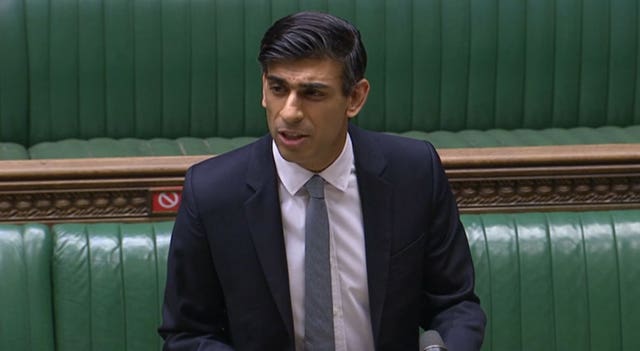
Mr Sunak said forecasts show the response to Covid-19 is “working”, adding: “The Office for Budget Responsibility is now forecasting, in their words ‘a swifter and more sustained recovery’ than they expected in November.
“The OBR now expects the economy to return to its pre-Covid level by the middle of next year – six months earlier than they previously thought. That means growth is faster, unemployment lower, wages higher, investment higher, household incomes higher.”
12.36pm
Mr Sunak told MPs the damage coronavirus has done to the UK economy has been “acute” as he began his Budget statement.
He told the Commons that Covid-19 has “fundamentally altered” our way of life, adding: “Much has changed, but one thing has stayed the same: I said I would do whatever it takes – I have done and I will do.”
12.34pm

11.57am
Hundreds of jobs look set to be relocated from London to Darlington under the Chancellor’s Treasury North project.
In a video to his department’s civil servants, Mr Sunak said that after “a lot of thought and energy”, the new economic campus would be in the North East market town.
He said he was “really excited” about the decision, according to a recording of the message shared on social media.
11.54am
Mr Sunak holds the red box aloft ahead of his Budget address.
11.50am
Mr Sunak told ministers the impact of coronavirus on the national finances cannot be ignored, but the UK can be “optimistic about our recovery”, as he updated the Cabinet ahead of the Budget.
The Chancellor said the pandemic had hit the economy hard and “we must be honest with ourselves and the country about what that has meant”, with borrowing pushed to wartime levels, according to Downing Street.
Mr Sunak said “we know that we cannot ignore this problem and it wouldn’t be right or responsible to do so”.





